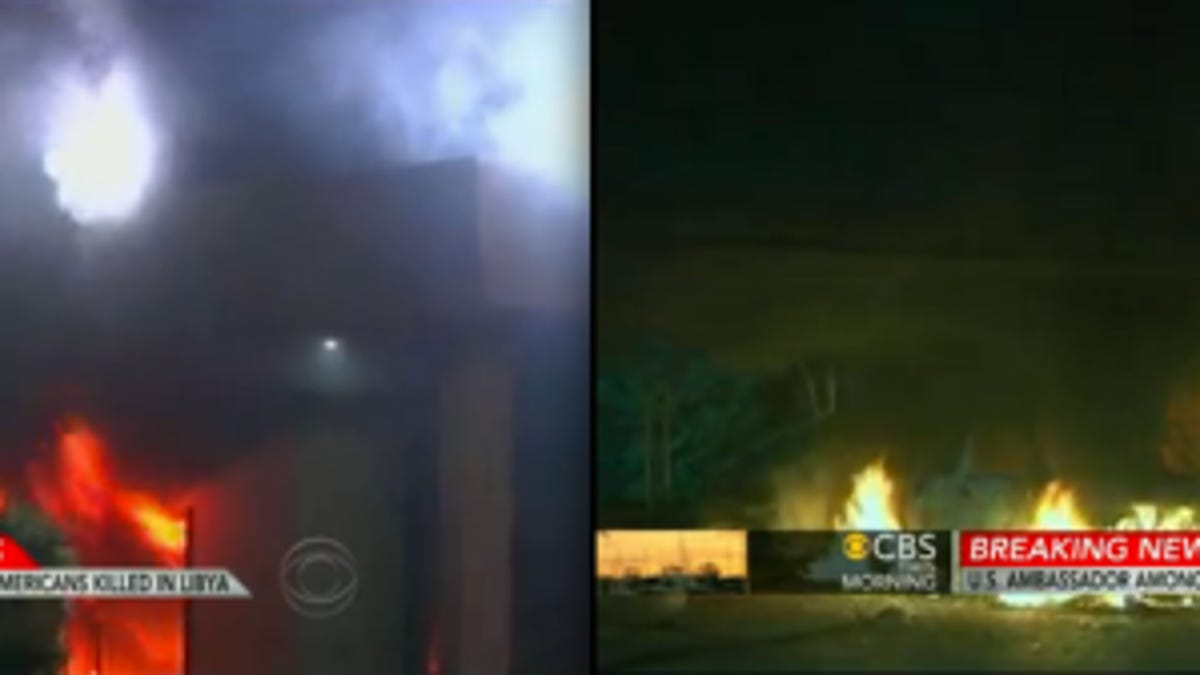Debate continues over YouTube and Libya attack
Congressional investigation charges that Americans were murdered in a well-planned attack that, contrary to what Obama administration said at the time, had nothing to do with a crude anti-Islam video on YouTube.

If you were paying attention last month, you might remember alarming headlines reporting an anti-Islam YouTube video "sparks violence in Libya," is "inciting violence," and caused "U.S. embassy workers' deaths."
One problem: those reports were untrue.
A flurry of disclosures in Washington, D.C., this week revealed that the Obama administration's blaming of the YouTube video for prompting a military-style attack that killed four Americans in Benghazi was wrong. And those revelations have reignited a long-running partisan debate over national security and security funding.
Republicans suggested that the White House's efforts targeting the crude, now-deleted video clip -- including attempting to get Google to yank it -- were intended to deflect attention from State Department security lapses. The Benghazi compound had been attacked repeatedly before the deaths, including an improvised explosive device that was placed at the north gate, breaching the wall, and the British ambassador had been attacked by rocket-propelled grenades over the summer.
"This was never about a video, it was never spontaneous, this is terror and I want to know why we were lied to," Rep. Trey Gowdy (R-S.C.) said during a House Oversight committee hearing this week that revealed security cameras showed no protests in Benghazi that evening, which was the anniversary of the 9/11 attacks.
For its part, the State Department acknowledged this week that there was no protest of the video in Benghazi, and has blamed U.S. intelligence agencies for providing erroneous information. And White House press secretary Jay Carney said today that the recent furor has "largely been a political attack by Republicans." He added that "matters of security personnel are appropriately discussed and decided upon at the State Department by those responsible for it."
Rep. James Lankford (R-Okla.) said that initial reports may have been confused. But, he said, "I find it very difficult (to believe) five, six, seven days later, this same story is coming out when there was constant communication... It just seems like a very difficult story for me to be able to believe."What Lankford was referring to was a series of efforts by top Obama administration officials to link the video with those non-existent protests in Benghazi. (There were protests in Cairo and elsewhere, however.)
But Susan Rice, U.S. ambassador to the United Nations, told NBC's Meet the Press five days after the attack that: "What happened in Benghazi was in fact initially a spontaneous reaction to what had just transpired hours before in Cairo, almost a copycat of the demonstrations against our facility in Cairo, prompted by the video."
Secretary of State Hillary Clinton echoed those remarks two days earlier, saying that "we've seen rage and violence directed at American embassies over an awful Internet video." And the White House's Carney offered the same explanation, saying that "we are working to ensure that our diplomatic personnel and our diplomatic facilities are secure as we deal with the response to this video, which we believe is offensive and disgusting."
Google, which owns YouTube, did not immediately respond to a request for comment from CNET this afternoon. Last month, it rejected demands to remove the video -- which is protected by the First Amendment -- but blocked access for Libya and Egypt. A company spokesman said at the time that: "We work hard to create a community everyone can enjoy and which also enables people to express different opinions. This can be a challenge because what's OK in one country can be offensive elsewhere. This video -- which is widely available on the Web -- is clearly within our guidelines and so will stay on YouTube."
Rep. Jason Chaffetz (R-Utah) said at this week's hearing that the earlier attacks on the U.S. compound in Benghazi showed the State Department was not taking security seriously:
We didn't acknowledge it. We didn't talk about it. We pretended it didn't happen. It was a terrorist attack on a U.S. asset in Libya, and it was never exposed. We pretended it didn't happen. Well guess what? The third time the terrorists came to attack us, they were even more successful, killing four Americans. I believe, personally, with more assets, more resources, just meeting the minimum standards, we could have and should have saved the life of Ambassador Stevens and the other people that were there.
Patrick Kennedy, Undersecretary of State for Management, responded to the allegations by saying "there was no actionable intelligence indicating that there was a plan or any indication of a massive attack of the nature and lethality" of what eventually happened.
Last updated at 2:50 p.m. PT

